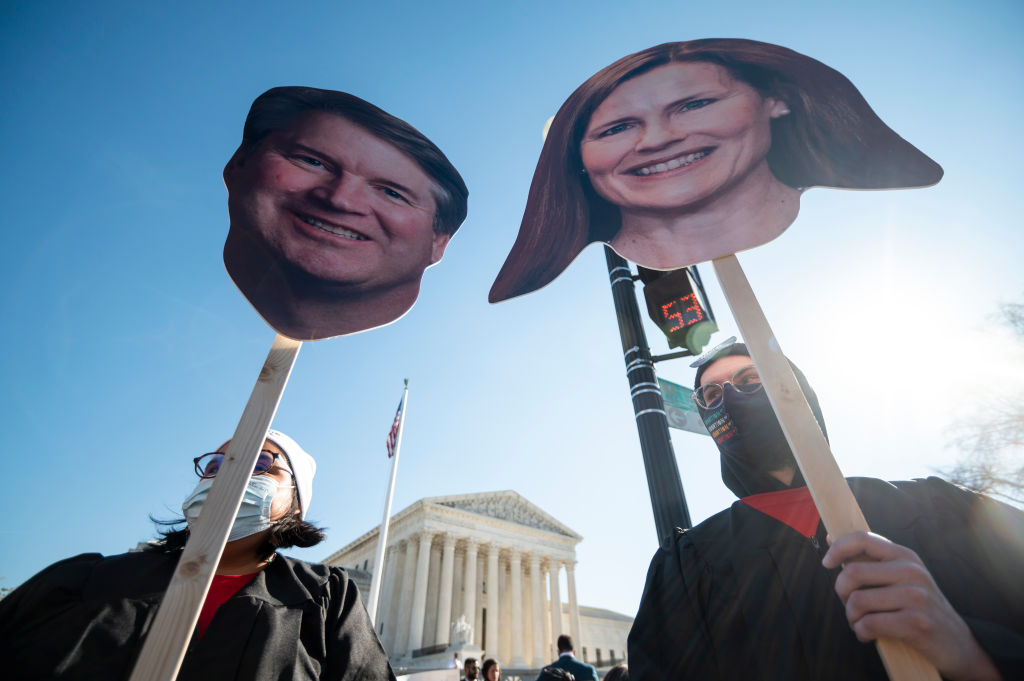They hate her ‘cause they ain’t her.
Life at Stake

The Dobbs ruling will determine the future of American conservatism.
Now that the dust has settled after oral arguments, we are left to wait, in all probability, for at least half a year until we know the final outcome of Dobbs v. Jackson—whether the court will finally decide to undo their grievous error in Roe v. Wade, whether they will reaffirm it, or whether they will stake out some new, arbitrary, middle ground between the two. While we wait, it is worth considering what exactly it is that hangs in the balance, dependent on the whims of a handful of unelected lawyers in Washington, D.C.
The most obvious, and by far the most important, issue at stake is the fate of the hundreds of thousands of unborn children legally killed each year in abortions. More people die in this country of legal abortions annually than die of heart disease. Ending abortion would have the same effect, in terms of lives saved, as simultaneously curing Alzheimer’s, diabetes, influenza, pneumonia, and cancer. Even a ten percent reduction in the number of abortions would be (numerically, at least) equivalent to preventing all suicides and all non-abortion murders, forever.
Many commentators have likewise pointed out that the future of the pro-life movement and of conservative legal philosophy will be drastically different depending on the outcome in Dobbs. If Roe is overturned, we will be entering new, uncharted territory. If Roe is upheld, or merely tweaked, the pro-life movement’s decades-long Court-based strategy will have failed, and it is unclear what exactly would, or could, replace it. If the conservative legal movement’s hand-picked champions are the ones who fail to overturn Roe, their entire project will need to be overhauled.
But more than just these movements are at stake. Over the past few decades, the country has watched as the left has taken over nearly every elite institution and used them to enforce woke progressivism on the rest of the country. Roe was an early example of this kind of institutional hijacking, but since then, the problem has only spread. Now, politics is just about the only lever of power that the right has any influence over. Combating the woke left’s long march through the institutions, and repairing the damage done, ought to be the primary goal of the conservative movement. Dobbs will be the first major test case of whether or not we have any hope of doing so.
If Roe is upheld, or only moderately tweaked, the pro-life movement—and, indeed, the American experiment as a whole—will be in deep trouble. This is the most favorable Court we can reasonably hope to have for at least another generation, and sending abortion back to the states is arguably the bare minimum that their office requires of them. Continuing to bar legislatures from protecting life would mean that the sensibilities of the elites (which legal minds often conflate with the Court’s “legitimacy”) have the final word in our system. It would mean that the Court can overrule the natural law, the common law, the Declaration, the Constitution, the Fourteenth Amendment, and countless acts of state and federal legislatures on a whim. And it would mean that the people have no reasonable recourse to oppose them. A pro-Roe ruling in Dobbs would leave the right little hope unless Republican politicians are willing to reassess their current views of judicial supremacy, which is difficult to imagine.
But even if Roe is overturned, it remains to be seen whether the right is serious about fighting to undo the damage. So far, the response from conservative groups and Republican officials has been underwhelming. Accustomed to the past half-century of throwing up their hands and pointing to the Court whenever the issue of abortion arises, they are terrified with the prospect of being asked to do something themselves. Speculating about the post-Roe landscape, many simply point out the obvious fact that the states will deal with the issue in a variety of ways, and decline to comment further. Others, asked whether abortion will continue to be a motivating force on the right, try to change the subject. Given the foundational nature of the right-to-life issue and the popularity of many restrictions on abortion, a serious question is raised: if so-called conservatives can’t go on offense on abortion, will they be able to fight back against anything?
How an elected official handles the outcome in Dobbs will tell you everything you need to know about his or her ability to oppose the institutions destroying the American way of life. If they get Dobbs wrong, there’s nothing they’ll be able to do right.
The American Mind presents a range of perspectives. Views are writers’ own and do not necessarily represent those of The Claremont Institute.
The American Mind is a publication of the Claremont Institute, a non-profit 501(c)(3) organization, dedicated to restoring the principles of the American Founding to their rightful, preeminent authority in our national life. Interested in supporting our work? Gifts to the Claremont Institute are tax-deductible.



